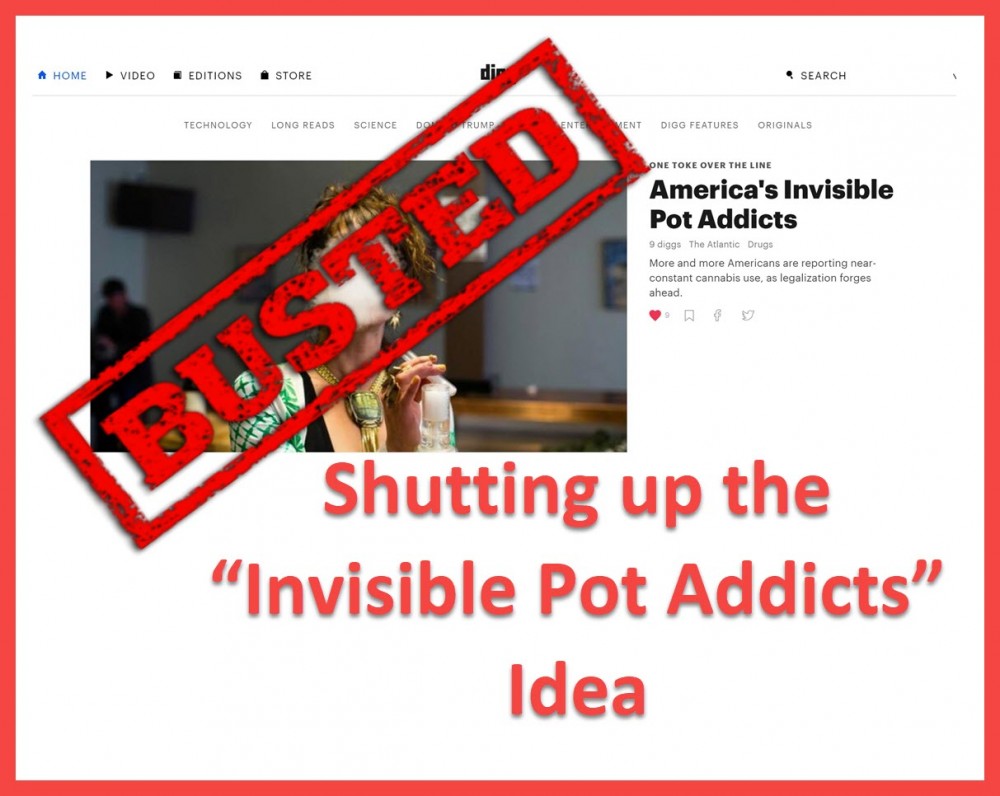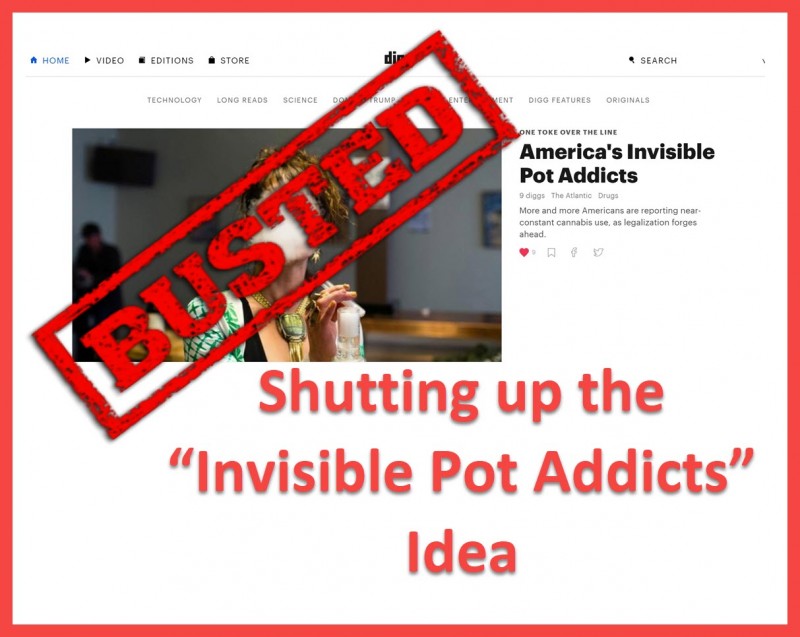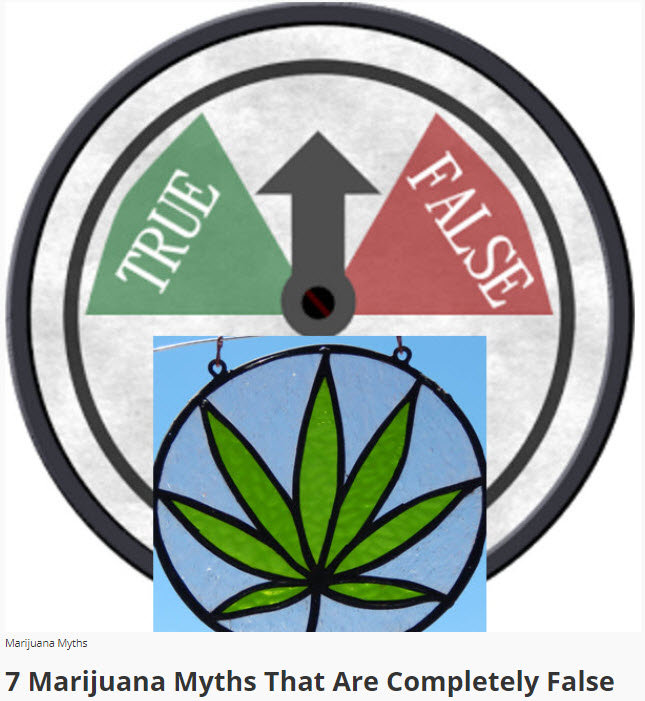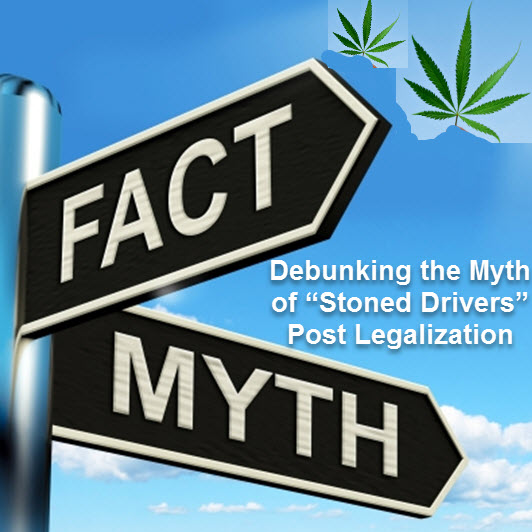Shutting up the “Invisible Pot Addicts” Idea

I recently read an article in The Atlantic written by Annie Lowrey where she outlined her opinion about the ‘unseen risks of legalization’. Her entire argument is based on the idea that because Americans see Marijuana as benign that the corporatization of cannabis is creating more pot addicts which apparently affect more than we know.
One of her arguments point out that people (adults predominantly) are using cannabis at a much higher rate than before. This is, before it was legal. In some cases, daily or near daily use has jumped to 50%. This compared to the NIDA stat of 9% of people who smoke weed will become addicted.
The problem with this assessment is that daily use doesn’t mean addiction. There are people that drink a glass of wine every single day. Do we call them alcoholics?
According to organizations such as NIDA, these daily wine drinkers are “alcoholics” or “heavy drinkers”. Within their realm of rationalization, consuming anything daily means automatically you’re an addict.
However, it is important to make the distinction between daily use and addiction. For instance, if someone smokes up every single night after a long day of work to unwind…how does that make them an addict. Just because of the substance in question?
If you’re having trouble sleeping and go to a doctor, they will either prescribe you a regimen of exercises or some Zoloft to get you sleeping. Within this scenario, if you take Zoloft every night to go to sleep…are you addicted or just ‘medicating’?
And this is where Cannabis is also very different from every other type of recreational drug on the market. Due to the cannabinoid activity within the plant and the plethora of medical benefits these terpenes and cannabis provides to the endocannabinoid system; many people substitute cannabis for medicines like Zoloft.
But I digress.
WE DON’T KNOW THE RISK PROFILE ARGUMENT
Eventually throughout her article she touched on a point that I’d like to touch on. The entire idea of “We simply don’t have enough research” is a fallacy. The United States Government for the past 40-50 years have funded studies specifically looking into “what makes marijuana dangerous”.
Only recently are we taking a closer look at the medical benefits of cannabis, however when prohibition was in full rage…most of the studies were funded to show how bad cannabis is for you. Unfortunately, the vast majority of those studies only showed the opposite to be true. Hell, it’s part of the reason why the US Federal government has a patent on certain cannabinoids.
The “Risk Profile” of cannabis has been established. The LD-50 or the “Lethal Dose where 50% of test animals died” is set to 1:20,000 and 1:40,000. In other words, it is virtually impossible to overdose on cannabis.
Of course, the psychological aspects of cannabis could play a role within the mental structure of an addict. However, for an addict…if it’s not one substance it’s another. If they aren’t addicted to cannabis, they would be addicted to food, sex or anything really.
Nonetheless, we can’t place heavy regulations on cannabis based on the reactions of a small minority of people.
Let me put it to you this way. Some people will inevitably crash their cars and kill other people. This is fact. Does this mean that we get rid of all cars, place limits on how fast cars can go?
We do have some regulation when it comes to cars though. We make sure they are road worthy, we have certain rules and guidelines within the public space…however we’re not placing limits on manufacturers. We’re not setting a National Top Speed of 60 MPH where every car manufacturer is forced to make cars that can only go 60 MPHs.
Similarly, placing restrictions on a budding industry, setting limitations on THC levels and so forth is irrational.
The only reason why “some people” are having issues with cannabis is because the government has been spreading misinformation about cannabis for decades. The “trust” in the government authority have diminished over time.
Cannabis is a mind altering substance and you should always be careful when you’re playing with brain chemistry, however the problem doesn’t lie with the substance but rather education surrounding the substance.
Furthermore, addiction goes far beyond any particular substance. It has to do with identity, purpose, behavioral patterns, genetics and of course a sense of belonging.
Finding common ground
Now I get it, let’s not be stupid and think marijuana is this almighty plant that won’t ever harm a single soul. However, going to the extreme and trying to blow up the symptoms of “cannabis use disorder” and its societal impacts is also irrational.
This is a statists approach to a problem. I’m more leaning towards simply educating people and providing avenues of assistance for those who can’t cope with all the change.
OTHER STORIES YOU MAY ENJOY...
7 MARIJUANA MYTHS THAT ARE COMPLETELY FALSE, CLICK HERE.







